Note: This article was originally published on July 3, 2015 on SmartBeijing.com.* It has been republished here, in February 2020, with permission. Re-upping this article in particular as research for my & Krish Raghav’s forthcoming book Open All the Buddha Boxes — more on that here!
Michael Pettis is a familiar name for anyone who’s as much as scratched the surface of Beijing’s underground music scene over the last decade. The world-renowned economic theorist has been living in Beijing since 2002, and for most of that time has contributed enormous time, energy, and resources into supporting some of the most progressive, often least commercial elements buzzing within this city’s subterranean sonic channels.
His first venture of note on that frontier was the now-legendary Wudaokou rock’n’roll dive D-22, which was founded on the momentum of early-2000s scene lynchpins Joyside and P.K.14, and shot to international acclaim after fostering the self-dubbed “No Beijing” band collective, whose composite members — Carsick Cars, Snapline, White — are now household names, at home and abroad. After a year running D-22, Pettis realized a need to document the vital new scene his club had midwifed into existence. He soon co-founded, with P.K.14’s Yang Haisong, Maybe Mars, which remains one of the most prolific independent record labels in China.
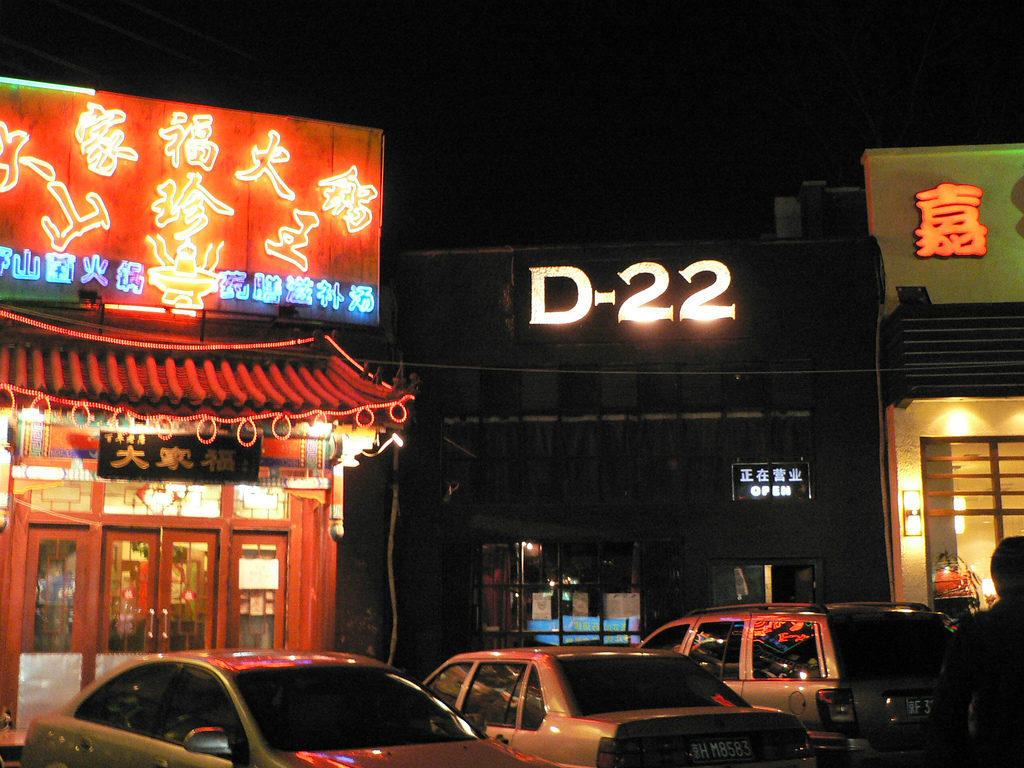
D-22 closed in January 2012, due to, Pettis said in my exit interview with him at the time,
a desire to do something different within the Beijing rock scene.
Specifically, Pettis’ goal was to focus even more resolutely on the
least commercial, most ephemeral aspects of the experimental music
scene, best codified by the weekly Zoomin’ Night series that had
launched at D-22 in August 2009.
The result was XP, a gloriously impossible-to-classify home for Beijing
noise these last three years. XP shutters up for good after one final
trio of shows this Friday, Saturday, and Sunday. Ahead of that I sat
down with Pettis once again for a thumbnail recap of his Beijing history
pre-XP, his thoughts on how the Di’anmen venue fared in its mission to
promote avant-garde music culture in Beijing, and what he and Maybe Mars
have planned for future projects once their decade-long stretch of
operating some of Beijing’s most interesting live music venues grinds to
a halt this weekend…
***
SmartBeijing: When did you first move to Beijing? What were you doing here initially?
Michael Pettis: The first time I came to Beijing was in March
2001. I came on holiday. At the time I was working on Wall Street, and I
was marginally involved in the music scene. I had supported a couple of
labels. But during the week that I was in Beijing, it seemed like such
an interesting place. And I was getting a little bored with my work on
the Street, so I decided to move to China for two years, to learn as
much as I could about the country, then return to New York. I’ve ended
up here a lot longer than that, of course. But from the very beginning,
because of my interest in music, I started going to the various clubs
and livehouses to check out the scene. So I’ve been following the music
scene in Beijing pretty much since 2002.
SmBJ: What were the clubs you were going to back then?
Michael Pettis: I think my favorites were Nameless Highland and
What Bar. I used to go to the precursor to Yugong Yishan quite often. It
was up on the west gate of Qinghua University, which was where I was
teaching. I can’t remember the names… I don’t think 2 Kolegas had opened
up yet. But there were a handful of clubs scattered here and there.
SmBJ: What were the bands that impressed or stood out to you when you were going to shows back in the early 2000s?
Michael Pettis: Hang on the Box
I think is one of the unique and spectacular bands in musical history. I
don’t even consider them a part of Chinese history in that sense. They
were always incredibly impressive. I saw bands like Re-TROS… I was especially impressed by P.K.14 and by Joyside. But there were quite a few bands that were doing [interesting] things.
SmBJ: What were the bands that impressed or stood out to you when you were going to shows back in the early 2000s?
Michael Pettis: Hang on the Box I think is one of the unique and spectacular bands in musical history. I don’t even consider them a part of Chinese history in that sense. They were always incredibly impressive. I saw bands like Re-TROS… I was especially impressed by P.K.14 and by Joyside. But there were quite a few bands that were doing [interesting] things.
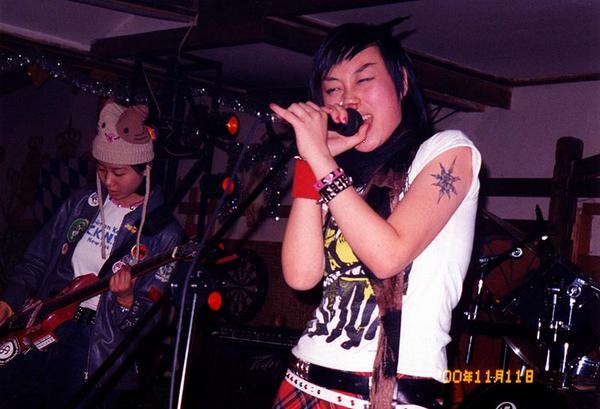
Michael Pettis: The problem with the scene then was that with the exception, I think, of Joyside and P.K.14, Hang on the Box, and one or two others — Glorious Pharmacy was one of the other great bands back then — with the exception of that small group of bands, there seemed to me to be a lot of pressure on Chinese bands to do fairly good replications of their favorite bands. So there were a lot of really good Ramones bands, and lot of really good Joy Division bands, and a lot of good Gang of Four bands. I suspect that that may have been because that was what the audiences were looking for. The audiences at the time were even more heavily dominated by expats than they are today. So the scene was what I think of as very provincial. Before I moved to New York I was very familiar with provincial scenes, in which there was talent but there wasn’t the self-confidence and the support for a real scene. It was really a provincial scene with occasional flashes of brilliance.
SmBJ: What led to you opening your own venue, D-22?
Michael Pettis: If you look at the history of music, basically from the mid-19th century onwards, and particularly in the last 50 years or more, what artists and musicians often talk about, far more than historians or the audiences realize, is specific places. There was always that club, whether it was Minton’s up in Harlem, or CBGBs, in which a particular scene developed. And it occurred to me that it’s really a small group of curators, or artistic entrepreneurs or whatever you want to call them, that are key in organizing the development of the scene. Because artists are always eager to do whatever it is that they do, and the big restraint is on their ability to do it and to be taken… not so much taken seriously, but be accepted as doing what they’re doing.
I felt that that was lacking in Beijing, because obviously clubs had to earn a living, and the way you earned a living was to attract expats, because they spent much more on drinks. And expats were really looking for a specific type of music with which they were familiar. So that put a lot of constraints on the abilities of clubs to really diversify, to experiment with new musicians. Another thing that drove me up a wall was that both Chinese and foreigners seemed to have a conception of the Chinese ability to make music that I thought was unrealistic, to put it mildly. There really was the sense that good music was something that foreigners, that Americans and Europeans, were able to do, but not really Chinese. You know, you’d have smart kids who were just un-attracted to mainstream Chinese culture, and ended up rejecting all forms of Chinese music and turning only to foreigners. There would be kids that were really proud of the fact that every CD they had was from an English or American band, and that was all they listened to.
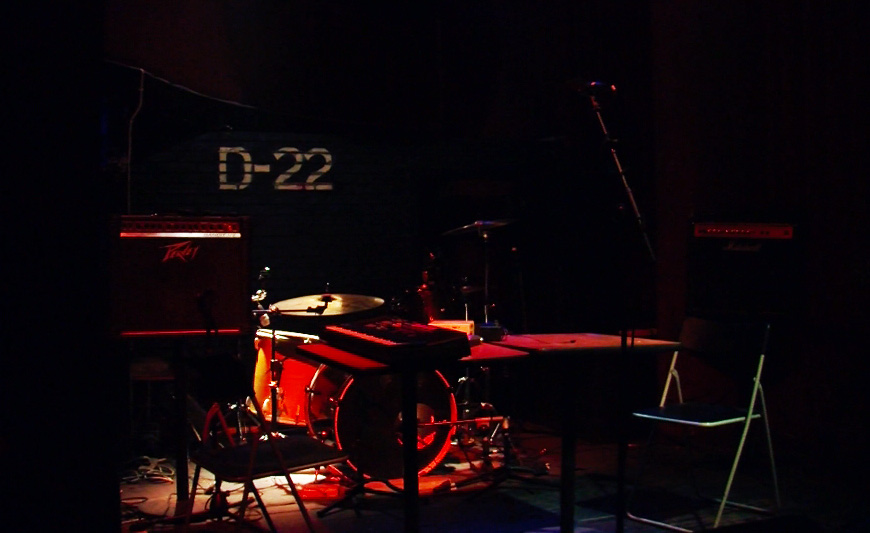
Michael Pettis: I think that’s obviously terrible for the scene. So I thought what would be really interesting to do, given what seemed to me like quite a lot of talent, would be to open a club that focused completely on the musicians, and in which the focus was on what the artists were doing, in which we would support their experimentation, and, above all, try to break that sense that many Chinese had that good rock’n’roll, good experimental music was not something that Chinese did, was something that foreigners did. I figured that the whole point of this new club that we opened up has got to be to change that mentality.
Being a New Yorker, perhaps I’m a little bit snobbish about these things, but we wanted a club oriented towards what the musicians did, rather than what audiences were expecting from the bands. I figured that in a city like Beijing, such a big city, there has to be a lot of talent, and if we gave them the space and the respect to do what they wanted to do, that we might end up within five or ten years with a really interesting scene. William Burroughs once said that there are really only two questions a critic is allowed to ask. The first question is, “What is the artist trying to accomplish?” And then the second question is, once you know that, “Is he doing it well or not?” And we wanted our club really to be built around that. We didn’t want to have any pre-conceptions about what the musicians were supposed to do. We simply wanted to let them do whatever they thought they were doing, then try to figure out if they were doing it well or not. And if they were, we would support them.
As soon as we opened D-22, we spoke to a number of well-known bands, and most of them were not particularly interested. We were quite far, out in Wudaokou. Some bands said, “Yeah, we’ll play for our normal fees.” But what struck me was that when we spoke to both Joyside and P.K.14, they immediately said, “We’re part of this.” In the early days we didn’t make any money, we were always trying to watch expenses, and they never asked us for money. They were willing to accept part of the door, and given that we were a new club and quite far away, that often meant that they’d have to truck all the way up there, perform a gig, and get very, very little money. But they were willing to accept that because they liked what we were doing. And that was very important for us.
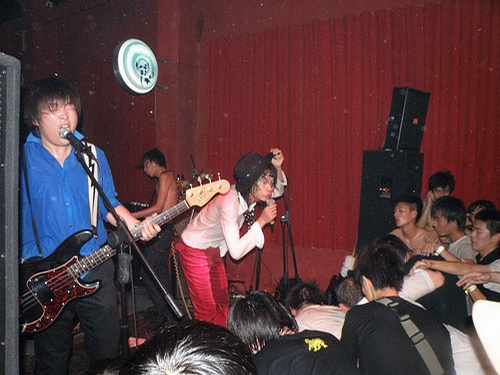
Michael Pettis: Those two bands immediately gave us a lot of credibility. I think most of the interesting music in this scene, in the last ten, fifteen years, you can sort of draw a line that begins either at Joyside or at P.K.14. Joyside, I would argue, taught young Chinese what they refer to as the “rock’n’roll spirit,” that sense of freedom, of “anything goes.” And of course, P.K.14, which is led by a well-known poet and artist [Yang Haisong], showed that rock’n’roll was a medium that Chinese artists can use. So to have those two bands support us right from the very beginning gave us instant credibility. In fact, there was one point at which I was planning to put up a big sign, “D-22: The House that Joyside Built.” Because in a way they really helped build us.
But we then ended up with a stroke of really astonishing luck, and that was that I had met [Zhang] Shouwang. I forget when, maybe in 2004. It’s a famous story which I won’t repeat, but the important point is that Shouwang was starting a band, and he attracted a group of other musicians that all started bands, and that became the famous No Beijing group.
These were very aggressive, hungry, and quite sophisticated young musicians who were really determined to do something. They didn’t know what it was, but they were going to do something. But because what they were doing didn’t really fit into the idea of what rock bands in Beijing were supposed to be doing, the only place they could play was occasionally at What Bar. And of course Yan Jun‘s [Waterland Kwanyin] Tuesday night series was very supportive. So we really thought that we were going to build D-22 around these bands.
And that was a very lucky decision, because those bands just exploded. And in their wake, so many other bands formed. I thought that might take five or ten years to do, and then I think by maybe one or two years it was accomplished. There was a brilliant Beijing scene in the process of being developed.
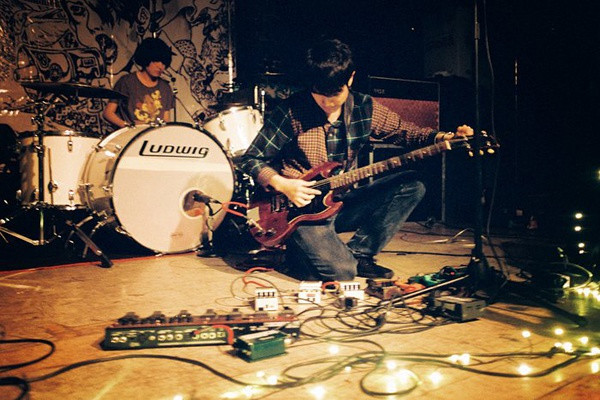
SmBJ: Around the time of the Olympics, D-22 was dubbed “the CBGB of Beijing” by some parachute journalist, and that tag then got repeated ad infinitum in the Western media. As someone with actual experience in that late-’70s Lower East Side scene, how do you think the incipient D-22 scene compared to the early CB’s scene?
Michael Pettis: The differences are very obvious. When you’re doing stuff in New York, you’re on a global stage. At the time in Beijing, there was nothing close to that feeling. There was never really a sense that what people in Beijing did would ever matter. So that’s a huge difference, and it’s a very important difference, because I think self-confidence is really key in the development of art. Particularly if you’re going to do anything that involves experimentation and moving away from the standards. Because it is very scary to basically strip yourself naked on stage and try not to get laughed at. So it was very important that we did that.
But what CBGBs in the early days had that was very similar to D-22 — and I think many clubs that have been credited for creating scenes — is that you had this group of people, and it was hard to tell the difference between the musicians and the audience. It was all constantly mixing back and forth. They were there together, as friends and as competitors, and there was this sense of friendly one-upmanship. One of your friends would come on and do something that was really interesting, so you knew that tomorrow you were going to have to come out and beat that. Among themselves they really built this scene which involved imitating, copying, counterbalancing, praising, this constant hustling to do better than what the last guy did. And that was very, very exciting.
The early days of CBGBs were just like that. Nobody really knew what was going on. There really wasn’t a scene, it was just a bunch of people who loved what each other were doing, but were determined to beat everybody else at it. And that was really the excitement of the early years.
SmBJ: When D-22 closed, you opened XP with even more of an
explicit focus on experimental music, and more specifically, the weekly
Zoomin’ Night
performance series that started at D-22 in August 2009. Fast forward
three years… Now that XP’s closing, do you think it was successful?
What did it accomplish?
Michael Pettis: Obviously it’s very hard for me not to think that
it succeeded. When we opened D-22, we just needed a place that would
encourage artists. But it was pretty eclectic. We had folk music, we had
Peking Opera, we had underground rock, we had anything we could think
of. But so many bands came out during that period, and Beijing developed
such a consciousness of itself as an interesting music place, and that
changed the audiences. The audiences no longer went to clubs to hear
somebody sound like Gang Four. They now really wanted to hear whatever
people were doing.
So we felt that a very eclectic club like D-22 was no longer necessary,
because there were a lot of people doing that. What we thought though
was that there was a particular part of the Beijing music scene that was
really fascinating, and that was, I think, as advanced as anything you
would see anywhere in the world, and that was these young musicians that
had become part of the famous Zoomin’ Night
series by Zhu Wenbo. We were getting kids as young as 17 years old
shyly showing up and slowly incorporating themselves into the scene. And
they were really doing wonderful stuff.
SmBJ: When D-22 closed, you opened XP with even more of an explicit focus on experimental music, and more specifically, the weekly Zoomin’ Night performance series that started at D-22 in August 2009. Fast forward three years… Now that XP’s closing, do you think it was successful? What did it accomplish?
Michael Pettis: Obviously it’s very hard for me not to think that it succeeded. When we opened D-22, we just needed a place that would encourage artists. But it was pretty eclectic. We had folk music, we had Peking Opera, we had underground rock, we had anything we could think of. But so many bands came out during that period, and Beijing developed such a consciousness of itself as an interesting music place, and that changed the audiences. The audiences no longer went to clubs to hear somebody sound like Gang Four. They now really wanted to hear whatever people were doing.
So we felt that a very eclectic club like D-22 was no longer necessary, because there were a lot of people doing that. What we thought though was that there was a particular part of the Beijing music scene that was really fascinating, and that was, I think, as advanced as anything you would see anywhere in the world, and that was these young musicians that had become part of the famous Zoomin’ Night series by Zhu Wenbo. We were getting kids as young as 17 years old shyly showing up and slowly incorporating themselves into the scene. And they were really doing wonderful stuff.
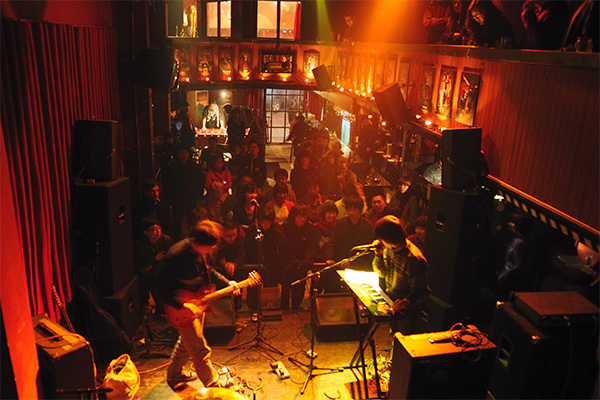
Michael Pettis: But the problem with that sort of music is it’s
simply not very commercial. It’s very hard to make money off that music.
But that was the scene that I thought needed support more than any
other, because it seemed it was becoming really, intellectually the most
exciting part of the scene, and because it was never gonna make any
money. So we thought what we really needed was a smaller club that we
could turn over to these guys. And that was the whole purpose of XP. We
had other bands, but if there was an “XP style,” I would say it would be
very hard to distinguish it from the Zoomin’ style. There was a lot of
overlap between the two.
SmBJ: You talked earlier about the idea of generational influence in Beijing bands descending from Joyside and P.K.14. That seems especially evident in younger Beijing bands like Birdstriking and Chui Wan, both of which you’ve supported through Maybe Mars, your record label. How have the cultures of D-22, Zoomin’ Night, and XP fed into Maybe Mars?
Michael Pettis: Maybe Mars started out with the intention of being a very small label that would support a few bands that we thought were good enough to deserve much higher quality recording, and we didn’t want them to be constrained by the need to sell CDs. There had been some good bands that had signed to other labels, and the complaint had been that there was a lot of pressure on them to sound a certain way, or if the first record sold well, then the second record had to sound like the first record… all the standard problems bands always complain about. So Maybe Mars was created basically to do on the CD side what D-22 had done, which was to select artists that we really liked, and to give them free rein to pursue whatever direction they wanted to pursue. The problem is that so many musicians wanted to join the label, and it was very hard to say no.
In the beginning, a bit like D-22, Maybe Mars was much more eclectic. We did a lot of different stuff. And then we decided that we might not be doing as well as we could. The disadvantage of focusing [on a certain style] would be that there were certain types of music that we weren’t going to support. But the advantage was that we would become much better at promoting the certain type of musicians that we especially liked. So I think there’s a lot of variety among the Maybe Mars bands, but I think all of them have a couple of things in common. It’s sort of hard to describe, but many of them have been influenced by the same people, and all of the bands are either very explicitly doing difficult, experimental stuff, or have at least one foot in that area. So there’s a lot of moving back and forth.
Michael Pettis: Beyond that, it’s very difficult to say exactly
what Maybe Mars does, except that we find bands that we really love. In
fact, the way we decide on signing a band is we have a meeting with all
of the members of Maybe Mars, and the question we ask is, “Would you
feel really proud about the fact that you are supporting this band?”
It’s really a question of pride. If we feel really proud about the music
that the performer is making, then we will decide to sign the band. And
we were lucky in that a lot of bands throughout China have been able to
sign with us. Our problem is not so much that we can’t find good bands,
but rather that, because, with the exception of a few of them they all
lose money, we’re constrained by the amount of money that we’re able to
lose. It’s grown very, very quickly. I think we maybe be the biggest
indie label in China on the basis of annual releases. And it’s going to
continue growing.
SmBJ: Through the lens of Maybe Mars and your venues, how have you seen the live music landscape in Beijing and Greater China change over the years?
Michael Pettis: The really interesting thing that has changed is the geographical distribution of the music, and this is part of the reason why we decided that it made sense to close XP. When we started, there were music scenes in a number of cities in China. Nothing particularly good, but Beijing was first among equals. The explosion in the Beijing music scene from 2005-2008, that sense of excitement, was so palpable, so great, that… a friend of mine in Shanghai actually criticized us for “denuding” the rest of China. By which he meant that everybody who was interested in music in China suddenly decided that they had to move to Beijing, and a lot of other scenes were effectively wiped out. Which was great for Beijing, but obviously not good for the rest of the country.
That’s changed a lot. The success of Beijing has inspired scenes in a lot of other cities, and one of the things that we’re finding now, is that, whereas in the old days nine out of ten bands that we’d sign would be Beijingers, now it’s more like 50/50. There are a lot of good bands coming from outside of Beijing.
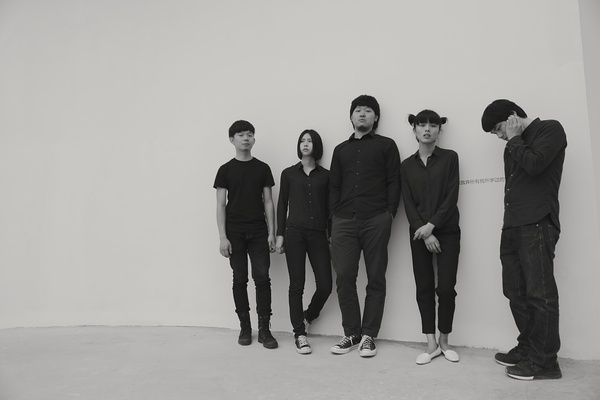
Michael Pettis: Brian Eno was once famously asked what was the greatest band in rock history. He said, “The Velvet Underground.” The reporter was very surprised. He said, “Yeah, but they only sold like 3,000 records.” And Eno’s famous response was, “Yes, but everyone who bought a record then went out and formed a band.” And I think to a certain extent, that’s what happened with Carsick Cars. I can’t tell you how many kids I’ve met who told me they decided to start rock bands when they got the first Carsick Cars record. And I think the reason was, before that, the assumption was that only foreigners could do this type of thing. And then when Carsick Cars came out, kids all around China suddenly realized, “We could do that, too.” So bands popped up all over the country.
For me, one of those great “a-ha” moments was, I think it was in 2009, some young kid walked into D-22. Way too early, like at nine o’clock. And we started talking, and it turned out that he had just come to Beijing for university. He was a freshman, and he had chosen to come to Beijing because that’s where Carsick Cars and D-22 were. And he showed me a record that he had made in high school, and the three bands listed on the back cover, the big influences, were Velvet Underground, Sonic Youth, and Carsick Cars. And I remember being absolutely delighted, because it was the first time that I had seen a Chinese kid include a Chinese band among the greats. And I think that was a really important thing.
By the way, that kid ended up becoming the drummer for Birdstriking, and meeting all of his heroes, etcetera. But as that happened, you saw all of these high school kids suddenly realize that this music belonged to them, too. And bands started popping up all over to the point where, now, Beijing is still the top city in China for music, but you can live in a place like Chengdu, for example, and have really great music all the time. And that’s something that’s quite new.
SmBJ: To elaborate on that, can you talk a bit more about why you’re closing XP, and what your plans are for the future? I know some of it involves being more active in other cities around China…
Michael Pettis: Basically it boils down to limited resources. There are only so many things that you can do. We wanted to spend much more time looking at what was happening outside of Beijing, and we had also, for a long time, been discussing doing more on the visual art side. In part because many of our musicians are doing really interesting work. Yang Fan‘s paintings, Shouwang’s photography, Zhan Pan [The Gar]’s paintings… there are a bunch of them doing really interesting stuff, and we thought we would really want to explore that.
So for more than a year now, I’d been thinking about the idea of opening… it’s sort of a weird hybrid. It’s not really a gallery, it’s sort of like a private gallery that becomes a workspace for a group of visually-oriented artists, to sort of do what the musicians were doing at D-22 in the early years, where you couldn’t tell the difference between a musician and a member of the audience. We want to do that with a group of young artists, and see if we can help develop that in relationship to the art scene.
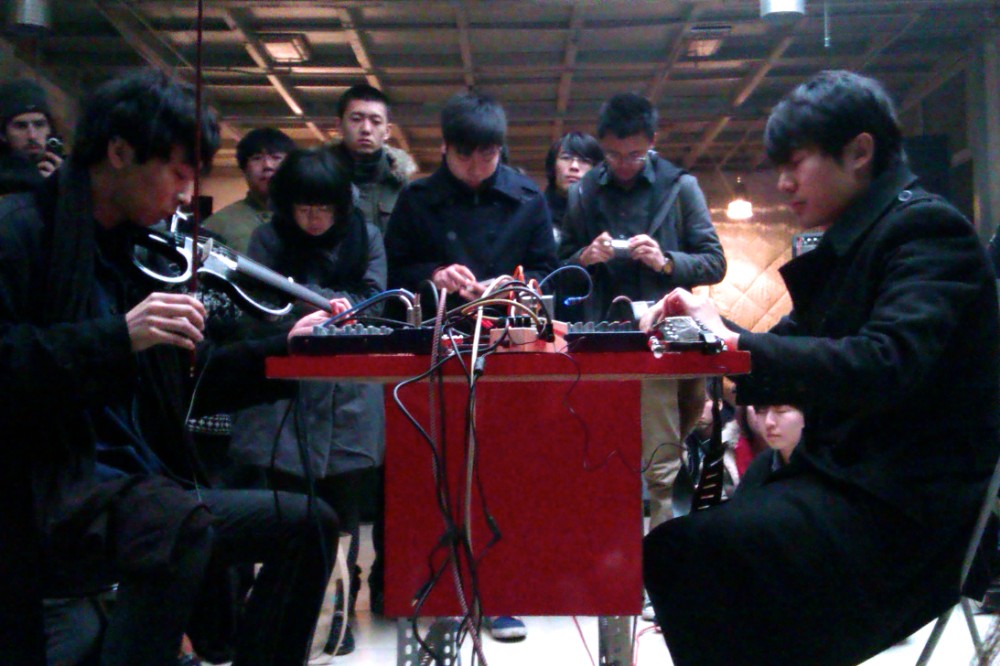
Michael Pettis: We also want to revive Sally Can’t Dance, a festival in which we try to bring the best or the most interesting experimental musicians and avant-garde composers from around China. We call it a festival, but it’s basically two days in which everybody is hanging out and performing for everybody else, sharing ideas and food, etcetera. We want to do that much more regularly. And we also want to organize more shows involving bands from outside of Beijing, where we can introduce Beijing to other cities, and other cities to Beijing.
But to do all of that and to continue running XP is way beyond our budget capacities. So we finally decided, after ten years, that it was time to give up running a livehouse, and to refocus on some of these other things. My suspicion is that in two years, we’re going to be dying to open up a livehouse again, and we will probably do so. But for the time being, we’re all a little bit tired of it, and we really want to focus on a different way of organizing the artists whose work we really respect.
SmBJ: Any closing comments?
Michael Pettis: One of the things that I really liked about XP is
that, even if I didn’t know them all, it would be very rare where I’d
go downstairs and not recognize at least half the faces. And I think
that’s been very important. Because it’s not just that musicians need
people to show up to their shows. Musicians don’t need a huge audience,
but what they do need is an audience that respects them and takes them
seriously enough that they’re willing to follow them wherever it is that
they go.
And that’s really all it takes. So to see these people who showed up day
after day, week after week, following and supporting these artists, I
think was crucially important in the development of the scene. And I
hope that continues. And certainly at our new space, we’re going to see
if we can keep that connection between the artists and the audiences
that respect them.
SmBJ: Any closing comments?
Michael Pettis: One of the things that I really liked about XP is that, even if I didn’t know them all, it would be very rare where I’d go downstairs and not recognize at least half the faces. And I think that’s been very important. Because it’s not just that musicians need people to show up to their shows. Musicians don’t need a huge audience, but what they do need is an audience that respects them and takes them seriously enough that they’re willing to follow them wherever it is that they go.
And that’s really all it takes. So to see these people who showed up day after day, week after week, following and supporting these artists, I think was crucially important in the development of the scene. And I hope that continues. And certainly at our new space, we’re going to see if we can keep that connection between the artists and the audiences that respect them.

***
*My writing career began at SmartBeijing, where in addition to events/listings-based coverage I wrote about 60 features on various topics, mostly related to music and art. SmartBeijing went down earlier this year for a scheduled server upgrade and never came back; the site’s parent company has told me they have no plans to extract the database, so the first three years of my writing career are basically consigned to vapor. There’s another post to be written about the precarity of writing for the internet etc etc, but for now I’m more interested in pulling what I can from the Internet Archive so that at least some of what I wrote for SmartBeijing isn’t permanently memoryholed. My impetus for doing this is largely to reevaluate old interviews as source material for a book on Beijing underground music 1999-2019 that I am co-authoring with Krish Raghav; learn more about that (and sign up for our biweekly newsletter!) here. I maintain a spreadsheet including all of my published articles (and links) which is publicly viewable here; if you’re a freelance writer, I highly encourage you to maintain a similar list. Without these dead SmartBeijing URL’s I’d have no way to access all of these old article!
